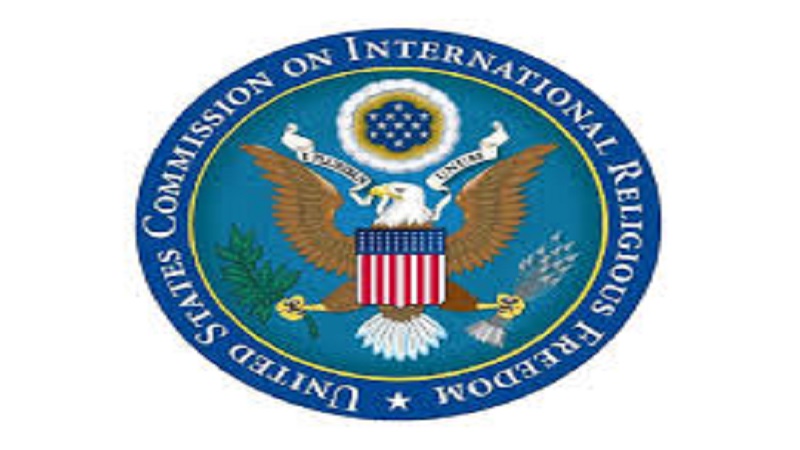
Image Courtesy:uscirf.gov
On May 21, the Indian American Muslim Council (IAMC), Hindus for Human Rights (HfHR) and International Christian Concern (ICC) co-sponsored a virtual Congressional briefing titled “USCIRF Recommendations on India – The Next Steps.”
This comes in wake of the recommendation by the United States Commission on International Religious Freedom (USCIRF) to designate India as a Country of Particular Concern (CPC) following a series of instances of targeting of minorities, especially Muslims. It was organized with the the intent to analyze the recommendations made by the USCIRF.
The briefing was chaired by IAMC and included several USCIRF Commissioners as the main speakers along with representatives from Amnesty International, IAMC, HfHR, and ICC.
Ms. Nadine Maenza, Vice-Chair of USCIRF, delivered the keynote address, with an incisive assessment of the existential crisis facing India’s democratic polity. Ms. Maenza specifically bemoaned the “#CoronaJihad” social media campaign intended to scapegoat Muslims as responsible for the Covid-19 pandemic.
Dr. Harrison Akins, South Asia policy analyst with USCIRF, while recognizing India as an ally of the United States, noted that “members of the ruling BJP have used the symbols of Hinduism and policies aimed at their protection as weapons against minority communities in their quest to further marginalize religious minorities and shape a Hindu nation.” Mr. Akins further noted, “combined with the BJP’s inflammatory rhetoric, these coordinated actions strengthen the perception that minorities, especially Muslims and Christians, are outsiders with no legitimate place in Indian history or society and, by their mere presence, a potential threat from within to the project of making India a Hindu nation.”
Mr. Francisco Bencosme, Asia Pacific Advocacy Manager of Amnesty International USA, shared concerns expressed by other panelists and highlighted the issue of activists imprisoned for peaceful dissent. He made a special note of Ms. Safoora Zargar, a pregnant student jailed for speaking up against the draconian citizenship law recently enacted in India. Mr. Bencosme remarked that “while the world faces a global pandemic, India has decided that now is the time to attack religious freedom.”
“Persecution, vigilantism, Hindutva and Hindu radicalism and the oppression of Christians is what characterizes India now,” stated Mr. Jeff King, President of International Christian Concern (ICC). Mr. Raju Rajgopal, co-founder of Hindus For Human Rights, urged everyone to distinguish between Hinduism and Hindutva. The true concept of “Hindu Rashtra,” as Mr. Rajgopal expounded, is actually one of inclusiveness and tolerance, while the “Hindutva Rashtra” that the RSS and its affiliates are clearly striving for, is violent, authoritarian and intolerant.
In a press statement IAMC, an advocacy group dedicated to safeguarding India’s pluralist and tolerant ethos stated, “The erosion of religious freedom is apparent in the abrogation of Article 370 and the horrific violations of human rights in Kashmir, a brutal clampdown on peaceful civil dissent against the Citizenship Amendment Act (CAA) and the National Register of Citizens (NRC) and the recent Delhi pogrom, among several other egregious instances of religious persecution.”
This only the latest in a line of actions undertaken by various international organisations and groups to condemn the persecution of minorities in India. Recently, Under-Secretary-General Adama Dieng, United Nations Special Adviser on the Prevention of Genocide had raised several key questions about the growth of hate speech and especially the targeting of the Muslim community in wake of the enactment of the Citizenship Amendment Act (CAA) and the nationwide agitation against it.
In a media statement released recently, Dieng said, “While the objective of the act, to provide protection to minority communities is commendable, it is concerning that this protection is not extended to all groups, including Muslims. This is contrary to India’s obligations under international human rights law, in particular on non-discrimination.”
Earlier, in a special communication dated May 6, four United Nations (UN) Special Rapporteurs have written to the government of India about their serious concerns with respect to violation of human rights that are made possible by several provisions of the Unlawful Activities (Prevention) Act 1967 and amendments made to it in 2019. The letter had raised concerns in relation to designation of individuals as “terrorists”, in the context of the ongoing discrimination directed at religious and other minorities, human rights defenders and political dissidents, against whom the law has been used. It urged for a review of provisions that are incompatible with India’s obligations under international human rights law.
It called the Government of India’s attention to their obligations under the International Covenant on Civil and Political Rights (ICCPR) and Universal Declaration of Human Rights (UDHR). The letter also raised concerns about how the definition of a ‘terrorist act’ as per UAPA differs significantly from that advanced by Special Rapporteur on the promotion and protection of human rights and fundamental freedoms while countering terrorism. It called the UAPA definition “overboard and ambiguous”. It also raises concerns about the definition of a “terrorist organisation” and “unlawful association”.
Related: